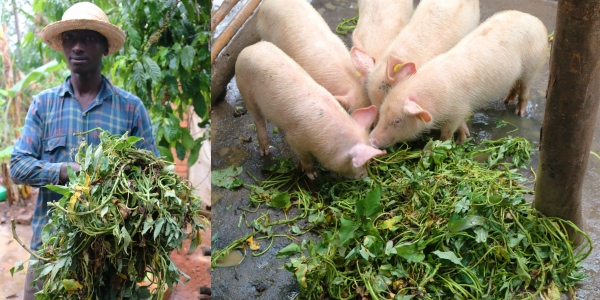Sweetpotato vines and leaves feed piglets on smallholder farms in Uganda (photo credit: CIP/RTB-ENDURE/Sara Quinn).
‘Scientists are today being awarded the 2016 World Food Prize for enriching sweet potatoes, with health benefits for millions of people.
‘They won the prize for “the single most example of biofortification”, resulting in Vitamin A-boosted crops.
‘Since 1986, the World Food Prize aims to recognise efforts to increase the quality and quantity of available food.
‘The researchers will receive their US $250,000 (£203,000) prize at a ceremony in Iowa, US, on Thursday.
Three of the 2016 laureates—Drs Maria Andrade, Robert Mwanga and Jan Low
from the CGIAR International Potato Center—have been recognised
for their work developing the vitamin-enriched orange-fleshed sweet potato (OFSP).
‘The fourth winner, Dr Howard Bouis who founded HarvestPlus at the International Food Policy Research Institute, has been honoured for his work over 25 years to ensure biofortification was developed into an international plant breeding strategy across more than 40 countries.
‘The World Food Prize ceremony will take place during the the Borlaug Dialogue International Symposium, a three-day gathering in Des Moines, Iowa, named after Nobel Peace Prize winner Norman Borlaug.
‘Dr Borlaug, often called the father of the Green Revolution, established the World Food Prize 30 years ago to recognise “exceptionally significant” achievements by individuals. In 1970, Dr Borlaug won the Nobel Peace Prize in recognition of his contribution to world peace through his work to increase global food supplies. . . .’
Read the whole article by Mark Kinver at the BBC: Sweet potato Vitamin A research wins World Food Prize, 13 Oct 2016.
Sweetpotato nourishes pigs as well as people:
A nutritious, affordable and available feed for smallholders
Written by Ben Lukuyu, ILRI scientist and Uganda country program leader
Small-scale pig farmers in Uganda face challenges in accessing feeds for their livestock. This project aims to counter this problem by investigating options for sweetpotato silage making and supplementation as well as developing business models to produce, conserve and commercialize sweetpotato-based feed.
—RTB-ENDURE sweetpotato flyer
Research on sweetpotato silage is one of four projects conducted by RTB-ENDURE, a 3-year project (2014–2016) implemented by the CGIAR Research Program on Roots, Tubers and Bananas (RTB). (The project’s full name is ‘Expanding utilization of roots, tubers and bananas and reducing their postharvest losses’.)
The aim of the project, which is being conducted in Kamuli and Masaka districts in Uganda, is to integrate sweetpotato feed into small-scale pig production systems, demonstrating to Uganda’s smallholder farmers three benefits of sweetpotato silage: increased pig productivity, affordable costs and labour savings. ILRI’s role in this project is to better understand pig feeding practices in Uganda, to investigate options for making sweetpotato silage, and to assess the economic viability of sweetpotato silage as pig feed, including the willingness of Ugandan farmers to pay for the silage.
Feeding is one of the main production constraints for smallholder pig farmers due to the seasonality, high cost and poor quality of feeds; coupled with limited knowledge of supplementation strategies. As a coping strategy, farmers extensively use crop residues, grasses, weeds and kitchen leftovers to feed their animals. Sweetpotato vines are the most commonly used fodder but they are highly seasonal and perishable. Simple silage making for feed conservation combined with strategic supplementation is an easy and affordable option for pig feeding during periods of feed scarcity and will contribute to reduce wastage of sweetpotato residues.
—RTB-ENDURE Sweetpotato Sub-Project
Most pig feeding in these two districts of Uganda was found to be ‘opportunistic’, with farmers staggering their feeding throughout the day, providing whatever feed they find available. Among a wide variety of local feeds available on Ugandan farms, sweetpotato vines are a major feed resource. But Uganda’s sweetpotato farmers waste on average 599kg of sweetpotato vines per acre per season, and about 5% and 11% of roots and peels, respectfully, harvested by farmers are wasted every season.
Ugandan pig farmers typically don’t mix their feeds to improve their nutritional quality, with the result that their pigs achieve poor growth rates (average daily gains). The RTB-ENDURE project evaluated sweetpotato silages as a basal diet for growing pigs. On-station results showed that sweetpotato-based silage gives 17% crude protein but that feeding pigs sweetpotato silage alone doesn’t support optimum weight gains. Diets mixing 60% sweetpotato silage with 40% maize soybean gave the best performance results. Use of silage based on sweetpotato vines was demonstrated to smooth feed supplies on smallholder farms, with pig growth improved by up t0 50% when 40% of the silage consisted of a concentrate feed.
This research project is led by the International Potato Center (CIP) and comprises, in addition to ILRI, Uganda’s National Agricultural Research Oeganization (NARO), Volunteer Efforts for Development Concerns (VEDCO), Coalition for Health, Agriculture and Income Networks (CHAIN-Uganda), Iowa State University, Makerere University, Uganda Martyrs University, Pig Production and Marketing Ltd, and farmer groups and other value chain actors in Masaka and Kamuli districts. The project is funded by the European Union (EU) and provided technical support from the International Fund for Agricultural Development (IFAD).
For further information, read:
Cow cafeteria? Exploiting the potential of sweetpotato as an animal feed in East Africa, CIP article.
Nutritious and affordable sweetpotato based silage: The feed solution for small-scale pig producers, poster, CIP flyer, 2015.
Sweetpotato silage making for pig feed in Uganda: A proposed business case, poster, 2014.
Sweetpotato Silage Making Manual, by Jolly Kabirizi, Ben Lukuyu (ILRI), Sarah Mayanja, Lule Peter (ILRI), Gerald Kyalo and Diego Naziri, 2015.


Can sweet potato Vines /silage be fed to sheep especially the Dorper sheep.